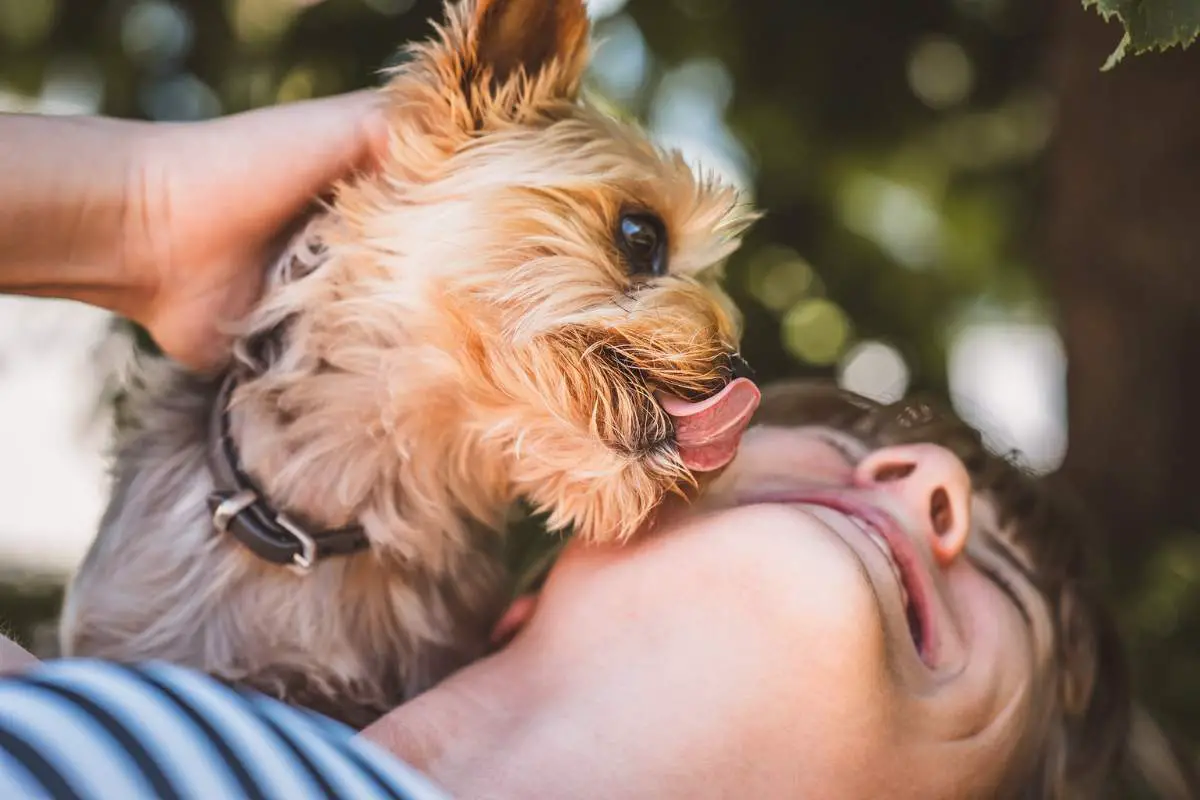Have you ever been woken up in the middle of the night by the sound of your dog licking you excessively? It can be a frustrating and confusing experience for any pet owner. While it’s normal for dogs to lick their owners to show affection, excessive licking can be a sign of an underlying issue that needs to be addressed.
Below, we’ll explore the possible reasons why your dog might be licking you excessively at night and what you can do to address the behavior. So, let’s dive in and find out what’s causing your furry friend’s late-night licking frenzy!
Six reasons your dog is licking you excessively at night
Here are six potential explanations for why your dog may be licking you excessively at night:
1. Your dog is trying to communicate their needs with you
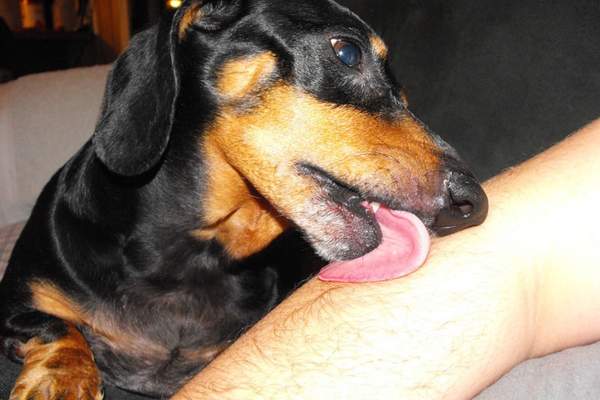
Dogs use various forms of communication to convey their needs and emotions to their human companions. Excessive licking is one way that dogs communicate with their owners.
Your dog could be trying to get your attention or show you affection. They might also be trying to tell you that they need something – like food, water, or attention.
They may also try to get you to participate in an activity with them, such as going for a walk or playing a game. So the next time your pup is giving you a thorough licking, take a moment to check if they may be thirsty, hungry or feeling uncomfortable in any way.
2. Your dog is anxious or stressed
Just like human beings, dogs can suffer from anxiety and stress. Excessive licking can be a response to fear or discomfort in your pup’s environment, and it’s their way of trying to cope with the situation. Your dog may be feeling anxious or stressed due to a sudden change in their environment, such as the arrival of a new pet or family member, a recent relocation, or even loud noises from outside.
If this is the case, your pup may be licking you to offer comfort and reassurance during times of stress or fear. This may come off as excessive licking to you, but it’s really your pup’s way of trying to make the situation better – even if it’s not always successful.
3. Your dog is bored or lonely
Dogs need mental and physical stimulation throughout the day to stay healthy and happy. If they don’t get enough exercise, mental stimulation, or attention, they can become bored and lonely. Your pup may be licking you excessively at night because they’re trying to express their need for more physical activity and entertainment.
Maybe they want to play fetch or take a walk with you. Alternatively, if your pup is home alone during the day while you’re away at work, they may just be trying to show you how much they missed you during the day and how happy they are when you’re around.
4. Your dog has a medical issue
In some cases, excessive licking can be caused by an underlying health issue in your dog. Itchy skin, allergies, gastrointestinal issues, or dental problems could all cause your pup to lick excessively at night in an attempt to self-soothe. If this is the case, you may notice other symptoms associated with your pup’s licking, such as redness, scratching, or digestive issues.
If you suspect your dog may have an underlying medical issue, it’s essential to get them checked out by a veterinarian as soon as possible. They can help diagnose and treat the condition properly so that your pup can find relief from their discomfort.
5. They sense something about you that you don’t
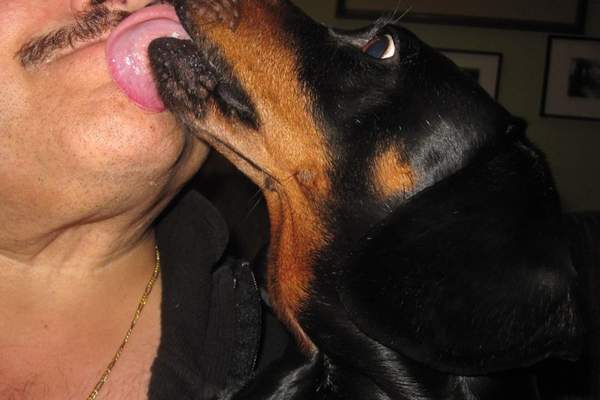
Dogs have the greatest sense of smell out of most animals. They can pick up on scents that humans can’t detect, like changes in your sweat or hormones. In fact, research shows that dogs can detect numerous types of cancers in humans.
They do this by detecting volatile organic compounds (VOCs) released by cancer cells. These VoCs produce an odor signature that can be detected on a person’s breath, skin, urine, sweat, or feces.
So, if your dog is licking you excessively at night, they could be trying to tell you that something is wrong with your health. Maybe they’re trying to show you they can sense something you can’t.
6. It’s a behavioral Issue
Finally, excessive licking can also be a behavioral issue. Some common behavior issues that can lead to excessive licking include separation anxiety, attention-seeking behaviors, and compulsive disorders. If this is the case, it’s essential to take steps to help your pup break out of the licking habit.
You can do this by working with a professional dog trainer or behaviorist to develop an appropriate plan for curbing your pup’s excessive licking. These experts can help you identify the underlying cause of your pup’s behavior and provide helpful tools for reducing their stress levels and improving their overall well-being.
What to do if your dog is excessively licking
Regardless of the underlying cause, it’s important to take action to help your pup. Here are a few tips for dealing with excessive licking in dogs:
1. Provide them with mental and physical stimulation
Ensure your pup gets enough exercise and mental stimulation throughout the day. Take them on regular walks, play fetch, and practice basic obedience commands each day. This will help keep your pup entertained and provide them with an outlet for their energy.
And if you’re too busy during the day, try enlisting the help of a professional dog walker or pet sitter to take your pup out for exercise and playtime. You can also consider taking your puppy to a doggy daycare, where they can socialize and play with other dogs while getting the exercise they need.
2. Distract them
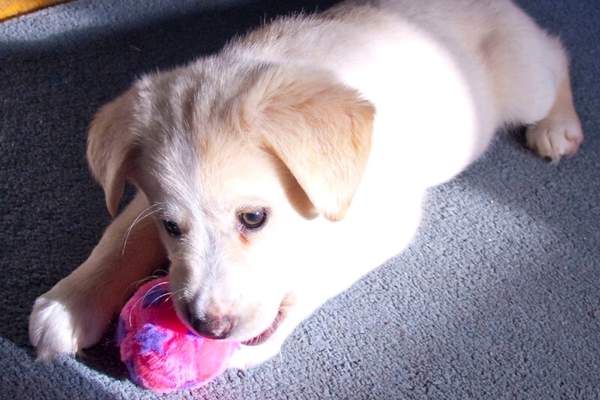
When you notice your dog licking excessively, try to distract them with a toy or engage them in an activity. This can help redirect their attention and break the licking habit. The best way to do this is by using interactive toys like treat-dispensing toys and puzzle feeders.
You can also initiate playtime or give your doggy a massage to de-stress them. Remember, the key is to redirect your dog’s attention away from the licking behavior and provide them with a positive alternative. By providing them with plenty of exercises, mental stimulation, and attention, you can help to break the licking habit and improve their overall well-being.
3. Teach them a new behavior
You can also try teaching your dog a new behavior to replace the licking. For example, you can teach them to “sit” or “lie down” on command and reward them with treats or praise when they follow the command. This will distract your dog from the licking behavior, provide them with mental stimulation, and help improve their obedience and behavior overall.
To get started, follow the below tips:
- Start with basic commands: Teach your dog basic commands like “sit,” “stay,” “come,” and “down.” This will help establish a foundation for more advanced behaviors.
- Use positive reinforcement: Reward your dog with treats, praise, or toys when they follow the command correctly. This will help motivate them to repeat the behavior.
- Be consistent: Use the same command every time you want your dog to perform the behavior, and be consistent with your rewards and praise.
- Practice regularly: Practice the new behavior in short training sessions throughout the day, gradually increasing the duration and difficulty of the exercise over time.
- Be patient: It may take some time for your dog to learn a new behavior, so be patient and persistent in your training.
4. Talk to a professional
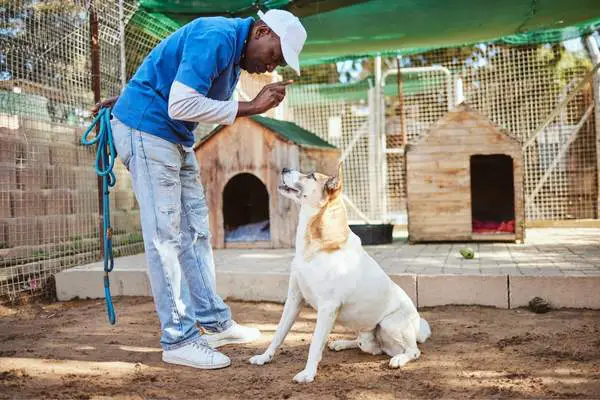
If the licking persists, it’s best to consult with a professional dog trainer or behaviorist. They can help you identify the underlying cause of the licking and develop an appropriate plan to address the behavior.
The behaviorist or trainer will evaluate your pup’s overall health and behavior, including any possible medical conditions that may be contributing to the licking behavior. If it’s determined that the licking is due to a behavioral issue, the professional can work with you to develop a behavior modification plan that addresses the underlying cause of the behavior.
This may involve teaching your pup a new behavior to replace the licking or addressing any anxiety or stress-related issues that may be causing the behavior. In some cases, medication may even be necessary to help manage anxiety or compulsive behaviors that may be causing the licking.

